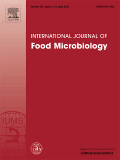
INTERNATIONAL JOURNAL OF FOOD MICROBIOLOGY
Scope & Guideline
Empowering Knowledge in Food Microbiology
Introduction
Aims and Scopes
- Food Safety and Microbial Pathogenesis:
Research focused on identifying, characterizing, and mitigating foodborne pathogens such as *Salmonella*, *Listeria*, and *Escherichia coli*, including their resistance mechanisms and virulence factors. - Fermentation and Food Production:
Studies on the use of microorganisms in the fermentation process of various foods, including dairy, meats, and plant-based products, focusing on the metabolic pathways and microbial community dynamics involved. - Biocontrol and Preservation Techniques:
Investigations into natural and innovative methods for controlling spoilage and pathogenic microorganisms in food, including the application of bacteriophages, essential oils, and novel antimicrobial agents. - Microbial Ecology in Food Systems:
Exploration of the microbial communities present in food environments and their interactions, including the impact of processing and storage conditions on microbial dynamics and food quality. - Antimicrobial Resistance Trends:
Research addressing the prevalence and mechanisms of antimicrobial resistance in foodborne pathogens, emphasizing the implications for public health and food safety.
Trending and Emerging
- Multi-Omics Approaches:
There is a notable increase in studies employing multi-omics techniques (genomics, transcriptomics, proteomics) to understand microbial functions and interactions in food systems. - Biotechnological Innovations in Food Microbiology:
Research focusing on the application of biotechnology, including the use of genetically modified organisms and synthetic biology, to enhance food safety and quality is gaining traction. - Sustainable Practices and Waste Utilization:
Emerging themes include the exploration of sustainable practices in food production and the utilization of food waste through microbial processes to create value-added products. - Natural Antimicrobials and Biopreservation:
There is an increasing emphasis on the use of natural antimicrobials, such as plant extracts and essential oils, as alternatives to chemical preservatives for food safety. - Impact of Climate Change on Food Microbiology:
Research is emerging that investigates how climate change affects microbial communities and food safety, particularly in relation to food production and storage practices.
Declining or Waning
- Traditional Food Preservation Methods:
Research on conventional methods of food preservation, such as salting and smoking, seems to be waning as newer technologies and natural preservatives gain focus. - Basic Microbial Characterization:
While still important, the publication of studies that primarily focus on basic microbial counts or identifications without deeper analysis of their ecological roles or interactions is decreasing. - Single Microorganism Studies:
Research solely focused on individual microbial species without considering their interactions within complex food matrices or ecosystems has become less prevalent, as integrative approaches are favored.
Similar Journals

CRITICAL REVIEWS IN MICROBIOLOGY
Connecting Scholars to Cutting-Edge Microbial InsightsCRITICAL REVIEWS IN MICROBIOLOGY, published by Taylor & Francis Ltd, is a leading peer-reviewed journal that has made significant contributions to the field of microbiology since its inception in 1971. With a prestigious Q1 ranking in Applied Microbiology and Biotechnology, as well as in Medicine and Microbiology, this journal is recognized for its high-quality reviews that synthesize current research and emerging trends in the discipline. Researchers and professionals rely on its comprehensive evaluations and critical insights, helping to advance knowledge and application in various microbiological contexts. Although the journal does not currently operate under an open access model, it remains an invaluable resource for academics seeking to stay at the forefront of microbiological advances. With a consistent publication record, CRITICAL REVIEWS IN MICROBIOLOGY continues to support the scholarly community by addressing key issues and innovations within the field.
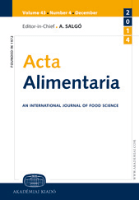
ACTA ALIMENTARIA
Advancing food science through rigorous research.ACTA ALIMENTARIA is a renowned journal in the field of food science, published by AKADEMIAI KIADO ZRT, based in Hungary. Since its inception in 1973, it has served as a vital platform for disseminating high-quality research on food chemistry, microbiology, nutrition, and technology, contributing significantly to the advancement of knowledge in the agricultural and biological sciences. Currently classified in the Q3 quartile of the 2023 Food Science category, the journal is positioned to address pressing issues pertaining to food safety, quality, and sustainability, making it an invaluable resource for researchers, professionals, and students alike. Although it does not currently offer open access, the journal maintains a strong reputation with a readership keenly interested in the latest developments in food science. With a Scopus rank placing it in the 38th percentile of its category, ACTA ALIMENTARIA continues to be a pivotal reference for those engaged in food research and innovation.
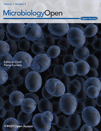
MicrobiologyOpen
Unlocking the frontiers of microbiology through open access.MicrobiologyOpen is a prestigious, open access journal published by WILEY, dedicated to advancing the field of microbiology. Since its inception in 2012, this journal has firmly established itself as a significant platform for researchers, professionals, and students alike, facilitating the dissemination of high-quality research findings across a wide range of microbiological disciplines. With an impressive impact factor and a ranking in the 76th percentile of Scopus for immunology and microbiology, MicrobiologyOpen offers a robust forum for innovative studies, reviews, and compelling insights that push the boundaries of scientific understanding. The journal's commitment to open access ensures that groundbreaking research is freely available to the global community, fostering collaboration and knowledge-sharing. As it continues to evolve until 2024, MicrobiologyOpen remains pivotal for anyone looking to stay at the forefront of microbiological research.

INDIAN JOURNAL OF MICROBIOLOGY
Connecting Ideas, Cultivating Microbial ExcellenceINDIAN JOURNAL OF MICROBIOLOGY, published by Springer, serves as a vital platform for the dissemination of cutting-edge research in the field of microbiology. With an ISSN of 0046-8991 and an E-ISSN of 0973-7715, this esteemed journal invites contributions that span various disciplines within microbiology, encompassing both fundamental studies and applied research that can impact health, environment, and industry. Recognized in the Q3 category in Microbiology for 2023, and ranking #80 out of 182 in Scopus’ Microbiology category, it reflects its commitment to quality and significance in the academic community. Authors and researchers benefit from the journal's comprehensive review process, which enhances the visibility and reach of their work. While no open access options are currently offered, the INDIAN JOURNAL OF MICROBIOLOGY remains a premier choice for those aiming to contribute to the ongoing dialogue in microbiological studies, ensuring that knowledge continues to evolve and thrive.
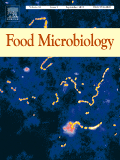
FOOD MICROBIOLOGY
Exploring the unseen world of food microbiology.FOOD MICROBIOLOGY is a premier journal, published by Academic Press Ltd - Elsevier Science Ltd, dedicated to advancing the field of food science and microbiology. With an impressive impact factor and recognition as a Q1 journal in Food Science and a Q2 journal in Microbiology, it holds a significant position in the scientific community, emphasizing research that explores microbial phenomena in food products. Established in 1984, the journal continues to thrive with converged coverage until 2025, making it an essential resource for researchers, professionals, and students aiming to deepen their understanding of food-related microbiological issues. While it operates under traditional access options, the journal is highly regarded for its rigorous peer-review process and impactful contributions to agricultural and biological sciences, ranking #26 in Food Science and #22 in Microbiology according to Scopus. Researchers are encouraged to submit their findings that impact food safety, quality, and preservation, fostering a collaborative environment that generates knowledge pivotal for the food industry and public health.
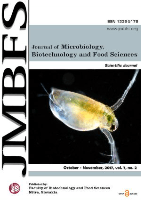
Journal of Microbiology Biotechnology and Food Sciences
Innovating solutions for a sustainable future in food and biotechnology.Journal of Microbiology Biotechnology and Food Sciences, published by SLOVAK UNIV AGRICULTURE NITRA, is a distinguished open-access journal dedicated to advancing scholarship in the interrelated fields of microbiology, biotechnology, and food sciences. With an ISSN of 1338-5178, this journal has been accessible to researchers worldwide since 2011, providing a platform for innovative studies that contribute to the understanding of microbial processes, biotechnological advancements, and food science applications. As reflected in its 2023 category quartiles, the journal holds notable positions in Biotechnology (Q3) and Food Science (Q3), and while it ranks in the lower quartiles for Microbiology (Q4) and Molecular Biology (Q4), it is committed to enhancing its impact within these domains. The journal encourages the submission of high-quality research articles, reviews, and short communications that address critical issues in these fields, making it an essential resource for academics, industry professionals, and students alike. Emphasizing both foundational research and practical applications, the Journal of Microbiology Biotechnology and Food Sciences stands as a vital contributor to the scientific discourse, fostering innovation and collaboration among researchers aiming to solve pressing challenges in food safety, biotechnology development, and microbial studies.
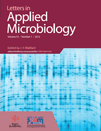
LETTERS IN APPLIED MICROBIOLOGY
Elevating Knowledge in Applied MicrobiologyLETTERS IN APPLIED MICROBIOLOGY, published by OXFORD UNIVERSITY PRESS, is a prominent journal in the field of applied microbiology, serving as an essential platform for researchers and professionals to disseminate innovative findings. With an ISSN of 0266-8254 and an E-ISSN of 1472-765X, this peer-reviewed journal has been contributing to the scientific community since 1985 and continues to engage with cutting-edge research through 2024. With its current Scopus ranking placing it in the 45th percentile of its category, specifically at rank #70 out of 127 in the Applied Microbiology and Biotechnology field, it underscores its significance in advancing knowledge and applications pertinent to microbial science. Although it is not open access, LETTERS IN APPLIED MICROBIOLOGY offers comprehensive insights aimed at enhancing the understanding of microbiological phenomena in practical scenarios, making it a valuable resource for both seasoned experts and emerging scholars.

ARCHIVES OF MICROBIOLOGY
Fostering Innovation in Microbial ResearchThe Archives of Microbiology, published by Springer, is a reputable journal in the field of microbiology, serving as a vital platform for the dissemination of groundbreaking research and critical reviews since its inception in 1974. With an ISSN of 0302-8933 and an E-ISSN of 1432-072X, this journal operates out of Germany and maintains a global reach, promoting high-quality scholarship across multiple disciplines, including biochemistry, genetics, and molecular biology, as evidenced by its Q2 ranking in Medicine (miscellaneous) and consistent Q3 placements in other categories in 2023. Although the journal does not offer open access options, its rigorous peer-review process ensures that published articles are of the highest standard, making it an essential resource for researchers, professionals, and students keen on advancing their understanding of microbial sciences. As the journal converges toward 2024, it remains committed to fostering innovative microbiological research and facilitating interdisciplinary dialogue within the scientific community.
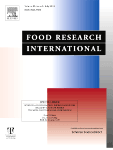
FOOD RESEARCH INTERNATIONAL
Exploring Innovations in Food Safety and QualityFOOD RESEARCH INTERNATIONAL is a premier academic journal published by ELSEVIER, specializing in the field of Food Science. With an impressive impact factor and ranked Q1 in the 2023 category quartiles, it stands at the forefront of research, positioned 17th out of 389 in the Scopus ranking for Agricultural and Biological Sciences, attaining a commendable 95th percentile. The journal publishes high-quality, peer-reviewed articles that cover a broad spectrum of topics, including food safety, quality control, nutrition, and biotechnology, making it an invaluable resource for academics, industry professionals, and students alike. As FOOD RESEARCH INTERNATIONAL seeks to enhance understanding and advance technologies related to food, it encourages innovative perspectives and interdisciplinary research. The journal, active from 1992 and continuing through 2024, is an essential platform for disseminating vital findings and fostering collaboration within the global food science community.

Foodborne Pathogens and Disease
Pioneering insights into foodborne pathogens and prevention.Foodborne Pathogens and Disease is a leading peer-reviewed journal, published by MARY ANN LIEBERT, INC, that focuses on the critical field of food safety and microbiology. With a robust ISSN of 1535-3141 and an E-ISSN of 1556-7125, this journal has established itself as a pivotal resource since its inception in 2004. It serves as an essential platform for researchers, professionals, and students dedicated to understanding the risks associated with foodborne pathogens and their impact on public health. The journal holds impressive rankings, being categorized in Q1 for Animal Science and Zoology and Q2 for Applied Microbiology and Biotechnology and Food Science according to the latest quartiles. Additionally, it ranks high within Scopus, occupying the 90th percentile in Agricultural and Biological Sciences (Animal Science and Zoology). Though not an open-access publication, it provides valuable insights and data that contribute to the evolving discourse on food safety, the prevention of foodborne diseases, and the advancement of biotechnology in food science. As it converges towards its 20th anniversary in 2024, Foodborne Pathogens and Disease continues to be an indispensable source of information for those committed to the betterment of food safety and public health.